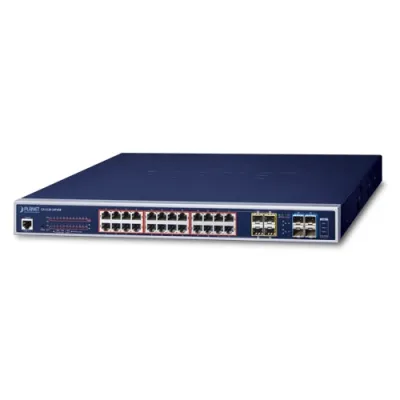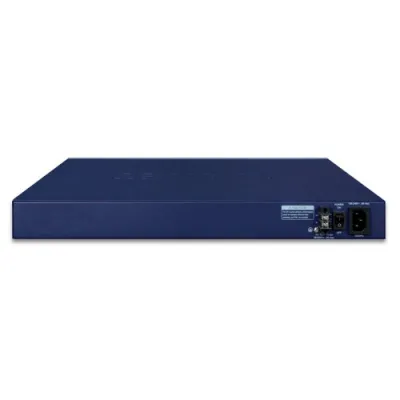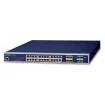PLANET GS-5220-24PL4X and GS-5220-24PL4XR Layer 2+ Managed PoE Switches support both IPv4 and IPv6 protocols, and hardware Layer 3 static routing capability. They comply with IEEE 802.3at Power over Ethernet Plus (PoE+), equipped with 24 10/100/1000BASE-T Gigabit Ethernet ports, 4 shared Gigabit SFP slots and 4 10G SFP+ uplink slots. Their 24 Gigabit Ethernet ports are integrated with 802.3at PoE+ injector function on all ports.
The GS-5220-24PL4X and GS-5220-24PL4XR can handle extremely large amounts of data in a secure topology linking to deploying Power over Ethernet networks, data center/service provider backbone or high capacity servers. They can work with a 10Gbps SFP+ server adapter to help SMBs build the 10Gbps Ethernet network providing 10Gbps NAS (Network Attached Storage) or heavy transmission of video streaming service.
- Complies with IEEE 802.3at PoE+/end-span PSE
- Up to 24 IEEE 802.3af/802.3at devices powered
- Supports PoE power up to 36 watts for each PoE port
- Auto detects powered device (PD)
- Circuit protection prevents power interference between ports
- Remote power feeding up to 100M
- PoE Management
24-Port Managed Switch - Features:
10G Ethernet Switch Solution for SMBs
PLANET GS-5220 24-port 802.3at PoE+ Layer 3 Managed Switch supports both IPv4 and IPv6 protocols, and hardware Layer 3 static routing capability. It complies with IEEE 802.3at Power over Ethernet Plus (PoE+), and is equipped with 24 10/100/1000BASE-T Gigabit Ethernet ports, 4 shared Gigabit SFP slots and 4 10G SFP+ uplink slots. Its 24 Gigabit Ethernet ports integrated with 802.3at PoE+ injector function on all ports.
The GS-5220 can handle extremely large amounts of data in a secure topology linking to deploying Power over Ethernet networks, data center/service provider backbone or high capacity servers. It can work with a 10Gbps SFP+ server adapter to help SMBs build the 10Gbps Ethernet network providing 10Gbps NAS (Network Attached Storage) or heavy transmission of video streaming service.

Layer 3 Routing Support
The GS-5220 enables the administrator to conveniently boost network efficiency by configuring Layer 3 IPv4/IPv6 VLAN static routing manually, and the OSPFv2 (Open Shortest Path First) settings automatically. The OSPF is an interior dynamic routing protocol for autonomous system based on link state. The protocol creates a database for link state by exchanging link states among Layer 3 switches, and then uses the Shortest Path First algorithm to generate a route table based on that database.
Redundant Ring, Fast Recovery for Critical Network Applications
The GS-5220 supports redundant ring technology and features strong, rapid self-recovery capability to prevent interruptions and external intrusions. It incorporates advanced ITU-T G.8032 ERPS (Ethernet Ring Protection Switching) technology and Spanning Tree Protocol (802.1w RSTP) into customer’s network to enhance system reliability and uptime in harsh environments. In a certain simple Ring network, the recovery time could be less than 20ms to quickly bring the network back to normal operation.
Network with Cybersecurity Helps Minimize Security Risks
The GS-5220 comes with enhanced cybersecurity to fend off cyberthreats and cyberattacks. It supports SSHv2 and TLSv1.2 protocols to provide strong protection against advanced threats. Served as a key point to transmit data over a long-distance fiber optic cable to customer’s critical equipment in a business network, the cybersecurity feature of the GS-5220 protects the switch management and enhances the security of the mission-critical network without any extra deployment cost and effort.
Redundant AC/DC Power Supply to Ensure Continuous Operation
The GS-5220-24PL4XR is particularly equipped with one 100~240V AC power supply unit and one 36~60V DC power supply unit to provide an enhanced reliable and scalable redundant power supply. The continuous power system is specifically designed to fulfill the demands of high-tech facilities requiring the highest power integrity. With the 36~60V DC power supply, the GS-5220-24PL4XR is able to act as a telecom-level device that can be located in the electronic room.
Convenient and Smart ONVIF Devices with Detection Feature
PLANET has newly developed an awesome feature — ONVIF Support — which is specifically designed for co-operating with Video IP Surveillances. From the GS-5220 PoE+ series GUI, clients just need one click to search and show all of the ONVIF devices via network application. In addition, clients can upload floor images into switch and allows for deploying location of surveillance devices for easier inspection and planning. Moreover, clients can get real-time surveillance’s information and online/offline status, and also allows PoE reboot control from GUI.

Flexible and Extendable 10Gbps Ethernet Solution
10Gbps Ethernet is a big leap in the evolution of Ethernet. Each of the SFP+ slots supports dual speed and 10GBASE-SR/LR, meaning the administrator now can flexibly choose the suitable SFP+ transceiver according to the transmission distance or the transmission speed required to extend the network efficiently. With its 4-port, 10Gbps Ethernet link capability, the GS-5220 provides broad bandwidth and powerful processing capacity.
Centralized Power Management for Gigabit Ethernet PoE Networking
To fulfill the needs of higher power required PoE network applications with Gigabit speed transmission, the GS-5220 features IEEE 802.3at PoE+ that combines up to 36 watts of power output and data per port over one Cat5E/6 Ethernet cable. It is designed specifically to meet the demand of higher power consuming network PD (powered device) such as IR, PTZ, speed dome cameras or even box-type IP camera with a built-in fan and heater. Compliant with both 802.3at and 802.3af, it allows more flexibility in power requirement for a variety of PDs.
Built-in Unique PoE Functions for Surveillance Management
As a managed PoE Switch for surveillance network, the GS-5220 features four special PoE management functions:
- PD alive check
- Scheduled power recycling
- PoE schedule
- PoE usage monitoring
Intelligent Powered Device Alive Check
The GS-5220 can be configured to monitor connected PD status in real time via ping action. Once the PD stops working and has no response, the GS-5220 will resume the PoE port power and bring the PD back to work. It will greatly enhance the network reliability through the PoE port resetting the PD’s power source and reduces administrator management burden.

Scheduled Power Recycling
The GS-5220 allows each of the connected PoE IP cameras to reboot in a specific time each week. Therefore, it will reduce the chance of IP camera crash resulting from buffer overflow.

PoE Schedule for Energy Saving
Besides IP surveillance, the GS-5220 is certainly applicable to construct any PoE network including VoIP and wireless LAN. Under the trend of energy saving worldwide and contributing to environment protection on the Earth, the GS-5220 can effectively control the power supply besides its capability of giving high watts power. The “PoE schedule” function helps you to enable or disable PoE power feeding for each PoE port during specified time intervals and it is a powerful function to help SMBs or enterprises save power and money.

Robust Layer 2 Features
The GS-5220 PoE+ series can be programmed for advanced switch management functions such as dynamic port link aggregation, Q-in-Q VLAN, private VLAN, Multiple Spanning Tree Protocol (MSTP), Layer 2/4 QoS, bandwidth control and IGMP/MLD snooping. The GS-5220 provides 802.1Q tagged VLAN, and the VLAN groups allowed will be maximally up to 4k. Via aggregation of supporting ports, the GS-5220 allows the operation of a high-speed trunk combining multiple ports. It enables up to 14 groups of 8 ports for trunk maximum and supports connection fail-over as well.
Powerful Security from Layer 2 to Layer 4
The GS-5220 offers comprehensive Layer 2 to Layer 4 Access Control List (ACL) for enforcing security to the edge. It can be used to restrict network access by denying packets based on source and destination IP address, TCP/UDP ports or defined typical network applications. Its protection mechanism also comprises 802.1X Port-based and MAC-based user and device authentication. With the private VLAN function, communication between edge ports can be prevented to ensure user privacy.
Advanced IP Network Protection
The GS-5220 also provides DHCP Snooping, IP Source Guard and Dynamic ARP Inspection functions to prevent IP snooping from attack and discard ARP packets with invalid MAC address. The network administrators can now construct highly-secure corporate networks with considerably less time and effort than before.
Efficient Management
For efficient management, the GS-5220 is equipped with console, Web and SNMP management interfaces.
With the built-in Web-based management interface, the GS-5220 offers an easy-to-use, platform-independent management and configuration facility.
For text-based management, it can be accessed via Telnet and the console port. For reducing product learning time, the GS-5220 offers Cisco-like command and customers do not need to learn new command
For standard-based monitor and management software, it offers SNMPv3 connection which encrypts the packet content at each session for secure remote management.
Intelligent SFP Diagnosis Mechanism
The GS-5220 supports SFP-DDM (Digital Diagnostic Monitor) function that greatly helps network administrator to easily monitor real-time parameters of the SFP, such as optical output power, optical input power, temperature, laser bias current, and transceiver supply voltage.

| Hardware Specifications | |
|---|---|
| Copper Ports | 24 10/100/1000BASE-T RJ45 auto-MDI/MDI-X ports with IEEE 802.3at PoE injector |
| SFP/mini-GBIC Slots | 4 100/1000BASE-X SFP combo interfaces with Port-21 to Port-24 Supports 100/1000Mbps dual mode and DDM |
| 10Gbps Fiber Uplink Ports | 4 1/10GBASE-SR/LR SFP+ slots Supports 1/10Gbps dual mode and DDM |
| Console | 1 RJ45 serial port (115200, 8, N, 1) |
| Switch Architecture | Store-and-Forward |
| Switch Fabric | 128Gbps/non-blocking |
| Throughput | 95 Mpps@64 bytes |
| Address Table | 16K entries, automatic source address learning and aging |
| Shared Data Buffer | 32M bytes |
| Flow Control | IEEE 802.3x pause frame for full-duplex Back pressure for half-duplex |
| Jumbo Frame | 10K bytes |
| Reset Button | < 5 sec: System reboot > 5 sec: Factory default |
| LED | System: SYS (Green) PWR (Green) (GS-5220-24PL4XR showed AC) DC (Green) (GS-5220-24PL4XR Only) FAN1 ( Red ), FAN2 ( Red ), FAN3 ( Red ), PoE PWR ( Red ) Ethernet Interfaces (Port 1 to Port 24): 1000 LNK/ACT (Green), 10/100 LNK/ACT (Orange) PoE Ethernet Interfaces (Port 1 to Port 24): PoE-in-Use (af/at-Orange) 100/1000Mbps SFP Combo Interfaces (Port-21 to Port-24): 1000 (Green), 100 (Orange) 1/10G SFP+ Interfaces (Port-25 to Port-28): 1000 (Green), 10G (Orange) |
| Power over Ethernet | |
| PoE Standard | IEEE 802.3at PoE Plus PSE |
| PoE Power Supply Type | End-span |
| PoE Port Power Output Ability | Max. 36 watts |
| Power Pin Assignment | 1/2(-), 3/6(+) |
| PoE Power Budget | 600 watts max. |
| PoE Ability | PD @ 7 watts: 24 units PD @ 15.4 watts: 24 units PD @ 30.8 watts: 20 units |
| Power Requirements-AC | 100~240V AC, 50/60Hz,10A |
| Power Requirements-DC | 36 ~ 60V,2A |
| Power Consumption (Full Loading) | GS-5220-24PL4X: AC 110V: Max. 45.8 watts/157.1BTU (Power on without any connection) Max. 657.9 watts/2257.2BTU (Full loading with PoE function) GS-5220-24PL4X: AC 220V: Max. 45.5 watts/198.6BTU (Power on without any connection) Max. 660.3 watts/2265.5BTU (Full loading with PoE function) |
| ESD Protection | 6KV DC |
| Dimensions (W x D x H) | 440 x 300 x 44.5 mm, 1U height |
| Enclosure | Metal |
| Fan | 3 x smart fan |
| Weight | 5040g (GS-5220-24PL4X) 5071g (GS-5220-24PL4XR) |
| Layer 2 Function | |
| Port Configuration | Port disable/enable Auto-negotiation 10/100/1000Mbps full or half duplex mode selection Flow control disable/enable |
| Port Status | Display each port’s speed duplex mode, link status, flow control status, auto-negotiation status, trunk status |
| Port Mirroring | TX/RX/Both Many-to-1 monitor |
| VLAN | 802.1Q tagged-based VLAN, up to 256 VLAN groups Q-in-Q tunneling Private VLAN edge (PVE) MAC-based VLAN Protocol-based VLAN Voice VLAN IP Subnet-based VLAN MVR (Multicast VLAN registration) Up to 256 VLAN groups, out of 4094 VLAN IDs |
| Link Aggregation | IEEE 802.3ad LACP/static trunk 10 groups of 16-port trunk supported |
| QoS | Traffic classification based, strict priority and WRR 8-level priority for switching - Port number - 802.1p priority - 802.1Q VLAN tag - DSCP field in IP packet |
| IGMP Snooping | IGMP (v1/v2/v3) snooping, up to 255 multicast groups IGMP querier mode support |
| MLD Snooping | MLD (v1/v2) snooping, up to 255 multicast groups MLD querier mode support |
| Access Control List | IP-based ACL/MAC-based ACL Up to 256 entries |
| Layer 3 Function | |
| IP Interfaces | Max. 8 VLAN interfaces |
| Routing Table | Max. 32 routing entries |
| Routing Protocols | IPv4 software static routing IPv6 software static routing |
| Management | |
| Basic Management Interfaces | Console, Telnet, Web browser, and SNMP v1/v2c |
| Secure Management Interfaces | SSH/SSL, SNMP v3 |
| ONVIF | ONVIF device discovery ONVIF device monitoring Floor Map |
| SNMP MIBs | RFC 1213 MIB-II IF MIB RFC 1493 Bridge MIB RFC 1643 Ethernet MIB RFC 2863 Interface MIB RFC 2665 Ether-Like MIB RFC 2819 RMON MIB (Groups 1 and 2) RFC 2737 Entity MIB RFC 2618 RADIUS Client MIB RFC 3411 SNMP-Frameworks-MIB IEEE 802.1x PAE LLDP MAU MIB |
| Standards Conformance | |
| Regulatory Compliance | FCC Part 15 Class A, CE |
| Standards Compliance | IEEE 802.3 10BASE-T IEEE 802.3u 100BASE-TX/100BASE-FX IEEE 802.3z Gigabit SX/LX IEEE 802.3ab Gigabit 1000T IEEE 802.3ae 10Gb/s Ethernet IEEE 802.3x flow control and back pressure IEEE 802.3ad port trunk with LACP IEEE 802.1D Spanning Tree Protocol IEEE 802.1w Rapid Spanning Tree Protocol IEEE 802.1s Multiple Spanning Tree Protocol IEEE 802.1p Class of service IEEE 802.1Q VLAN tagging IEEE 802.1x port authentication network control IEEE 802.3af Power over Ethernet IEEE 802.3at Power over Ethernet Plus IEEE 802.1ab LLDP RFC 768 UDP RFC 793 TFTP RFC 791 IP RFC 792 ICMP RFC 2068 HTTP RFC 1112 IGMP v1 RFC 2236 IGMP v2 RFC 3376 IGMP v3 RFC 2710 MLD v1 FRC 3810 MLD v2 |
| Environment | |
| Operating | Temperature: 0 ~ 50 degrees C for AC power input Relative Humidity: 5 ~ 95% (non-condensing) |
| Storage | Temperature: -40 ~ 80 degrees C Relative Humidity: 5 ~ 95% (non-condensing) |




